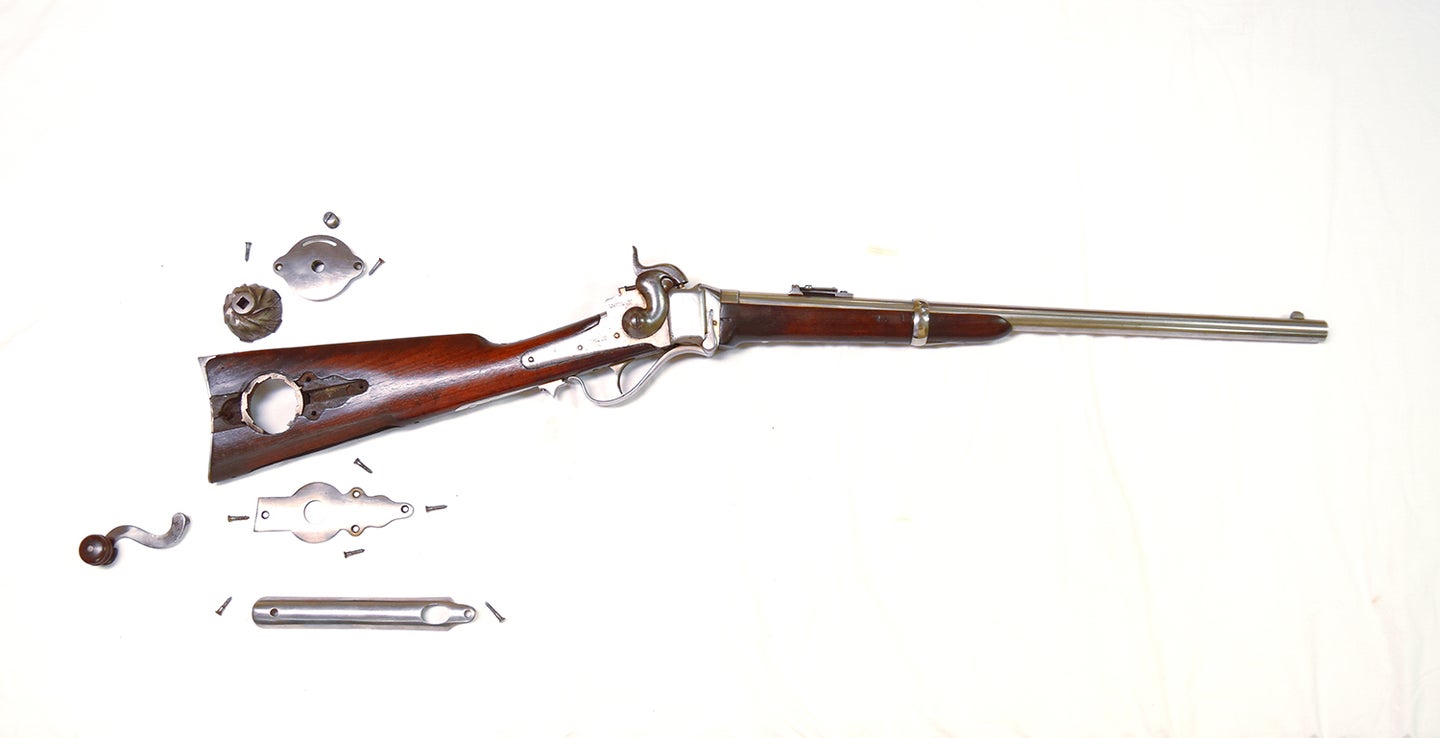Bizarre Guns: 6 of the Stranges Firearms Ever Made

We may earn revenue from the products available on this page and participate in affiliate programs. Learn more ›
The original concept for this article was firearms that were silly, useless, and laughable. And there is a good dose of that here. But the fact is, some of these bizarre guns made perfect sense at the time, although maybe things didn’t work out as planned. In any case, here are six of the strangest firearms ever put into production.
The Most Bizarre Guns Ever Made
The Krummlauf (STG-44) Assault Rifle
The Coffee Mill Sharps
The A-Square .577 T-Rex
The Velo Dog Revolver
The 3-Gauge Kiln Gun
The Gyrojet Rocket Gun
Bizarre Guns: Military Firearms
1. The Krummlauf (STG-44) Assault Rifle
Fitted to a Sturmgewehr 44 assault rifle, the Krummlauf curved barrel and sight allowed soldiers to shoot around corners. Rock Island Auction Company
Krummlauf means “curved barrel,” and refers to a barrel-and-periscopic-sight combination with a 30-degree bend that could be fitted to a standard Sturmgewehr 44 assault rifle. It allowed this bizarre gun to shoot around corners without exposing the shooter, and was intended for tank crews.
As World War II progressed, infantrymen were increasingly able to take out panzers on a regular basis if they could get right up to the tank and did not care especially about surviving.
German tanks counted on their own infantry to keep potential heroes out of range, and if this didn’t work out, they hosed down each other’s hulls. But sometimes that was not enough. Thus, the idea for the Krummlauf. A tank commander could unbutton his hatch, shoot whoever was trying to blow him up, and button up again, all without being exposed to bullets and other inconveniences.
The Krummlauf never really got all the bugs worked out of it. Bullets shattered inside the barrel, and barrels lasted only 300 rounds or so. I couldn’t find any reference to how many were made. The answer is probably, not a lot. After 1943, life inside a Panzer was no bed of roses. It was also short.
2. The Coffee Mill Sharps
This .52-caliber Sharps New Model 1863 Carbine from the Buffalo Bill Center of the West shows an exploded view of buttstock’s coffee grinder. Buffalo Bill Center of the West
The Union Army ran on coffee. Each soldier was issued 36 pounds of beans a year, and brewed it by the one-quart tin cupful, “strong enough to float a horseshoe” and heavily sweetened with sugar or molasses. It was issued in bean form because war profiteers were fond of mixing dirt into ground coffee, so Billy Yank got to roast and grind his own.
Most “grinding” consisted of bashing the beans between two rocks, and it occurred to Lt. Col. Walter King, detached from the 4th Missouri Cavalry to the Springfield Armory, that it might be useful to incorporate a coffee mill in the buttstock of the .52 Sharps carbine. The colonel gave the order, and so it was done. Perhaps 100 of the guns were thus modified.
The mill was a nice-looking piece of machinery, but it didn’t work very well, and so the whole project was dropped. Today, it’s thought that a dozen or so authentic coffee-mill Sharps survive, and they’re worth a lot of money. There are a great many more fake coffee-mill Sharps around; indeed, it’s a guess that this is one of the most-counterfeited firearms of the Civil War period. Which, somehow, relates nicely to adding dirt to coffee grounds.
Read Next: The 17 Most Innovative Military Firearms Ever
Bizarre Guns: Civilian Firearms
3. The A-Square .577 T-Rex
The .577 Tyrannosaurus, or T-Rex, was made to stop the most dangerous African game. Rock Island Auction Company
A-Square was the brainchild of Lt. Col. Art Alphin (Armor/USA), who, while an instructor at West Point, began building dangerous-game rifles chambered for standard cartridges and for his own line of proprietary rounds. Alphin retired from the Army in 1997 and went into the gun biz full time. His rifles were distinguished by their massive stocks, which he claimed helped to dissipate their godless recoil.
His masterpiece was the .577 Tyrannosaur, or T-Rex, which was developed in 1993 at the request of two Zimbabwe professional hunters (never named, as far as I know) who wanted a stopping rifle that would stop anything. The T-Rex is all of that. It fires a 750-grain bullet at an honest 2,450 fps and produces 10,180 foot-pounds of muzzle energy. Recoil is 172 foot-pounds in a 13-pound rifle. To put this in perspective, a .458 Lott generates about 73 foot-pounds in the same weight gun, and is far too much for all but experienced shooters.
If you’d like to see the T-Rex in action, there are a number of YouTube videos that show various misguided people trying to shoot this bizarre gun. All but a very few are flung about like rag dolls. A-Square closed its doors in 2012. This was a shame, because it made excellent rifles, bullets, and ammo. I had a .458 Lott A-Square in Caesar Grade, and it was a first-class buffalo basher. I sold it, and later met the man who bought it, and he and his sons were as pleased with it as I was.
4. The Velo Dog Revolver
This 6mm Velo Dog double-action revolver was designed to keep pooches from chasing bicyclists. Rock Island Auction Company
In late 19th century France, the bicycle, or velocipede as it was then called, came much in fashion, and dogs discovered that it was great sport chasing after peddlers and biting at their legs, or trousers, or God knows what. The answer to the problem was the Velo Dog revolver. The invention of one Rene Galand, it was a small double-action pocket revolver with a shrouded hammer and, in later models, a long, guardless trigger.
Also called Revolver de Poche (pocket revolver), it was just the answer for pesky poodles and their ilk. Velo Dog ammo was a centerfire 5.75mm round that was loaded with a conventional bullet, or cayenne pepper, or dust, or bullets made from wax, wood, or cork.
Dog plinking became so popular that Velo Dog revolvers were produced in varying configurations in Belgium, Germany, and Spain as well as France. There have been times when I have very much wanted one of these bizarre guns.
Read Next: The 50 Best Guns Ever Made
Bizarre Guns: Total Odd-Balls
5. The 3-Gauge Kiln Gun
An 8-gauge Remington Arms Model 400 Industrial Kiln Gun. Rock Island Auction Company
In the course of my visit to the now-gone-and-much-lamented Julia Auction House, I was shown a monstrous 3-gauge shotgun and asked to identify it, which I could not. At 5 feet long and 50 pounds, the bizarre gun was too small to be a punt gun and way too big to be a conventional game gun.
It was a kiln gun, and I did not know that such a thing existed. Steel mills, after the molten metal was poured from their kilns, found the enormous vats encrusted with slag, which is the stony residue that results when metal is melted out of its ore. The mills discovered they could get rid of it by sending men into the kilns with hammers—or they could blast the slag into dust with a shotgun. Thus, the kiln gun, which fired a monstrous charge of No. 12 shot through a slot in the kiln and did the job in an instant.
Kiln guns are still made today, although they look nothing like conventional firearms, and are 8 gauge instead of 3. The modern load fires a 3-ounce slug at 1,750 fps, and develops 9,000 foot-pounds of energy. A modern kiln gun weighs around 220 pounds and has a useful life of a quarter-million rounds. They are fired parallel to the kiln walls to avoid punching holes in it.
Read Next: 25 Shotguns, Rifles, and Pistols of the Rich, the Famous, and the Infamous
6. The Gyrojet Rocket Gun
An MBA Gyroget handgun, with 10 of the small rockets that gun is designed to fire. Rock Island Auction Company
In 1965, I received a phone call from a California knifemaker I knew named D.E. Henry. Was I aware, he asked, of a rocket gun made by a firm named MBAssociates. No, I was not, so Henry said I should get hold of one, and I did. It was, as they said at the time, a trip.
The MBA Gyrojet was made in handgun and carbine configurations. Rather than conventional ammunition, they fired 12mm or 13mm rockets called Microjets. These projectiles had angled ports in their bases that contained propellant, and a primer in their center. When you pulled the trigger, a flat striker ahead of the Microjet struck the rocket on its nose, driving it rearward into a fixed firing pin. This hit the primer, which ignited the ports, and the rocket accelerated to about 1,250 fps. The angled ports caused the rocket to spin in flight, removing the need for fins.
The advantages to the Gyrojet were several. Because it did not have to withstand the stresses of a conventional firearm, the frame was very light and very cheap. (It was, I recall, zinc alloy, plated in an attractive gold tone.) There was no recoil, and very little report. The disadvantages were unreliable ignition (the ports clogged), very slow reloading, and extreme lack of accuracy. After a couple of years, the whole project folded, although Gyrojets did make it into at least a couple of movies.
The post Bizarre Guns: 6 of the Stranges Firearms Ever Made appeared first on Field & Stream.
Articles may contain affiliate links which enable us to share in the revenue of any purchases made.
